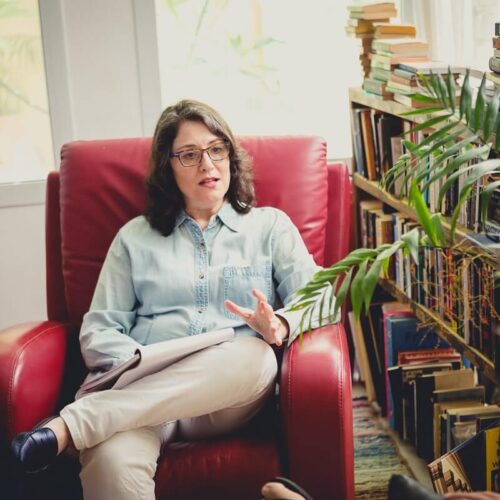Tamara Mendelson
Tamara Mendelson is an Internationally recognized writer, a sought-after wellness coach, and an educator with many years of experience teaching – online and in the classroom. Tamara teaches and coaches using humor, compassion, and empathy, which is her students’ and clients’ favorite superpower. When asked about why she started coaching, Tamara laughs, “I have been coaching all my life, being a good friend, an involved parent, and an empathetic teacher. I just didn’t call it coaching until 10 years ago.” Tamara received a Master’s Degree from Bar Ilan University in creative writing and English literature and has a certificate in Positive Psychology from UPENN. Tamara writes a weekly blog called “This Way Forward” and runs a Facebook Page with the same name where she does exactly that – helps people move forward.
She is also a member of the CREA Awards of 2021.

Hello Tamara Mendelson! Please introduce yourself to our readers?
Sure, thank you. I grew up in Portland, Oregon, one of four children, the daughter of a pediatrician and a pediatric nurse practitioner. I graduated from the University of Oregon with a B.S. in Political Science and communications. I lived in Los Angeles and San Francisco for about ten years working in retail, politics, and marketing. I was happily divorced in 2010 and I now live in Israel with my partner of 10 years in a country house which is surrounded by a beautiful garden he has cultivated for me. We each have two fabulous millennials. We also have a 25-pound cat that we rescued as a tiny kitten. The cat is not fat; just big-boned. I spend a few months every year in the United States. I am a wellness coach.
What did you do before becoming a wellness coach?
Well, I think I’ve always been a coach. People have always felt safe with me and told me their stories and I’ve always been helpful, supportive, and non-judgmental. I’ve also overcome many serious challenges in my own life that have uniquely prepared me for helping others. But before coaching professionally, I was a poet, writer, editor, and educator. I have a master’s in Creative Writing and English Literature. I taught college for seven years.
Did you enjoy being a college professor?
Definitely. My favorite part of teaching was helping my students learn and grow and become more confident with a little support from me. Although English was the subject, the object was always modeling life skills in a diverse society. One of my proudest moments as an educator was handing out diplomas to my first students four years later upon their graduation.
You said you are a writer. Have you written anything that we might know?
I meet them – where they are emotionally – and I help them get to where they want to be. We work through their pain, especially by recognizing unhealthy patterns. I help clients develop a personalized toolbox to look at their trauma in a different way and hopefully move forward to more balanced joyful lives. I don’t believe you need to wake up in pain every day and knowing that pain is not a final destination is a relief for most people. Modern life is always getting more complicated and everyone needs a little help to cope.
Yes. I teach resilience and that savoring life can be a choice. Having a different kind of life can be a choice. Living without shame should be a choice. Certain experiences we bury are very toxic. Revealing them to someone who is objective and non-judgmental in a safe environment brings relief and release from the grip of those things we have bottled up for too long. Letting go of fear and pain promotes post-traumatic emotional growth.
Sure. I had a client who was molested as a child by a teacher. This horrifying experience led to lifelong PTSD, which brought a lot of anxiety and self-doubt. He didn’t receive the support he needed from adults around him. We spent a year processing how his childhood abuse was still influencing his life, both as a husband and as a parent of two little girls. He was eventually able to let go of the anger and speak about his pain. Now he enjoys a fulfilling life. Today he is thriving, mostly by being kinder to himself. We occasionally have mental health check-ups. And, as a bonus, he was able to seek and find justice vis-à-vis the molester and the institution that employed him.
Do you ever turn down clients?Well, I don’t exactly turn them down, but we can agree not to work together. When working with any kind of coach or counselor you have to open up and get to the heart of the pain. There must be basic honesty and trust. It takes some guts to get out of your comfort zone and to tell the stories of your life and examine the decisions you’ve made and to get to a more centered and peaceful place you have to wade through some pain and unpleasantness. Some people just aren’t ready; staying stuck in their pain is all they know.
First, the only thing we can control is ourselves. We certainly cannot change the things that have happened and sometimes we cannot change the things that will happen, but we can always try to control how we react to them and be responsible for our own actions. Stand up for what we feel strongly about. Today, with social media, there is a tendency to lash out or hit back without thinking through the consequences. We can’t control what other people do, but we can control how we respond. And we can also be the model for calm clear thinking for our children and our society, the model of considered and rational and generous, and truthful behavior.
Thanks to Facebook and teaching at a college, I have gotten quite a few of these notes over the years. It’s nice to know when you have had a positive impact on people’s lives, isn’t it?
After my own divorce, I started, quite by accident, helping other people through their own separations, divorces, health scares, and major life changes. And I cherish the notes that tell me I was a confidante, a helper and a source of solace and peace.
What I’ve learned is that when we hold onto our stories and secret them away, they eat away at us, whittling us down bit by bit until that one story seems too horrible to tell, and in turn, stops us in our tracks. We are paralyzed, unable to move ahead to fine new happiness and joy in our lives. Keeping these personal tragedies close to us – making them sacred – in essence keeps us “stuck.” They leave many of us emotionally immobile and unable to heal.
Life is too short to stay paralyzed in fear and sadness over the death of a loved one, divorce, or a health crisis. You will survive, love again and flourish, with the right tools and support. And I am ready to be on your team.
Come. Share your stories with me. I would be honored to help you navigate your journey forward from darker days to lighter horizons. Click here to book a free call.

